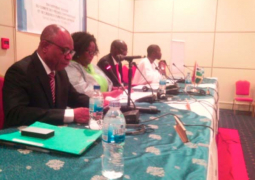
“It is the responsibility of the government to protect its people,” the minority leader and leader of the opposition in parliament declared, during the debate on the bill.
Kolley said the drafting of the bill followed nation-wide consultations with stakeholders as part of the ministry’s efforts to implement the National Trade Policy 2011, which called for such a law.
He added that before reaching the assembly, the bill was reviewed by the different stakeholders, including consumers groups, business representatives, regulators, regional administrators and other interested parties “to ensure that it will help achieve the objective of ensuring a fair and safe marketplace.”
In presenting the bill, Kolley said, “trade goes with competition, and where there is trade there is a need for consumer protection. Consumers want the goods and services purchased to be safe, no matter where they were produced. They want an effective remedy if a good purchased does not work or meet its intended purpose.
“Businesses also need safeguards and clearer and easy ways to resolve disputes with their partners and customers.
“This Bill has, therefore, made provision for consumer rights emphasizing on the need for consumers to get access to true, sufficient and timely information on technology, goods and services offered in the market, as well as on prices, characteristics, quality and risks that might be involved in the consumption of goods and services,” he added.
The bill has also provided for consumers’ right to safe and good quality goods and services, and the need for goods sold in The Gambia to comply with applicable national standards set by the Gambia Standards Bureau or any other national regulators, Kolley futher announced.
“With regards to supplier obligations to consumers, the bill has also made provision on the need for clarity of contracts, where they are made in the supply of goods and services.
“It has also highlighted unfair trade practices that should not be engaged in the course of business. The objective is to ensure clarity in the supply and consumption of goods and services, in a manner that ensures fairness in trade and the protection of consumer welfare, according to the Trade minister.”
The bill will be administered by the Gambia Competition Commission, GCC, which will set up consumer protection tribunals in all the administrative regions of the country, to hear and adjudicate consumer protection issues regulated under this bill.
The bill specifies the functions and powers of the GCC, as well as the functions and powers of the consumer protection tribunals.
“In implementing this bill, the Gambia Competition Commission, among other functions, will have to establish a directorate responsible for consumer protection, as well as receive consumer complaints, investigate these complaints and, where consumer rights are breached, present the cases to the consumer protection tribunals for hearing and redress.
“The commission is also responsible for building the capacities of the consumer protection tribunals through training, and will be responsible for monitoring and evaluating the activities of the tribunals for their effective operation. “The commission will also formulate the rules for the submission and treatment of complaints, as well as develop procedural rules for accepting complaints and assigning a case agent, serving notice on the other party and conducting an investigation.
“The consumer protection tribunals will hear complaints in respect of a breach of this bill, summon and enforce the attendance of the parties to any complaint, impose any sanction, penalty or remedy provided for in this bill to address consumer complaints.
The minority leader and leader of the opposition in parliament, Hon Samba Jallow, speaking during the debate on the bill, said his opposition National Reconciliation Party, NRP, had since 2001 been advocating for enactment of such a law.
“It is the responsibility of the government to protect its people not only by providing security, but also by addressing their well-being in what they eat, what they wear and where they sleep, and so on.
“Today we have seen all kinds of foodstuff imported without knowing the quality of these products,” Hon Jallow added, and called on the trade and industry minister to ensure food safety for consumers.
Read Other Articles In Article (Archive)




